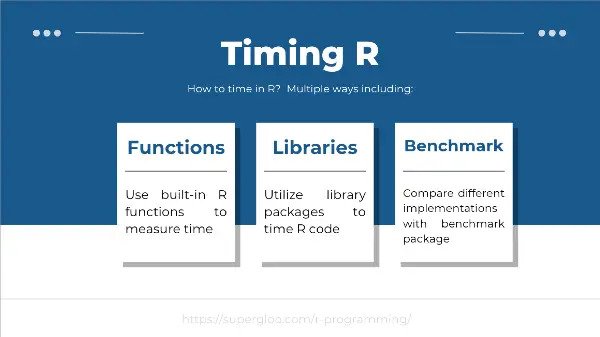
When working with R, it is essential to grasp the efficiency of your code, particularly when coping with computationally intensive duties or optimizing algorithms. Measuring the execution time of a perform in R is a standard observe, and there are numerous approaches to attain this purpose. On this complete information, we’ll discover completely different strategies for measuring perform execution time in R and when to make use of every of them.
The Want for Measuring Execution Timing in R
Earlier than we delve into the strategies for measuring execution timing R, it is important to grasp why you would possibly want to do that. Some widespread causes embody:
1. Efficiency Optimization: Profiling and measuring execution time can assist establish bottlenecks in your code. As soon as recognized, you’ll be able to give attention to optimizing these elements for higher efficiency.
2. Benchmarking: When evaluating the efficiency of two or extra features or code alternate options, you want correct execution time measurements to make knowledgeable choices.
3. Useful resource Administration: If you happen to’re working with massive datasets or resource-intensive duties, measuring execution time can assist you handle your system assets effectively.
4. High quality Assurance: Execution time measurement is efficacious for high quality assurance functions, guaranteeing that your code performs nicely underneath varied circumstances.
Now, let’s discover the completely different strategies out there for measuring execution time in R.
Read Also: Flutter Build Error when using iOS Simulator
Methodology 1: Fundamental R timer with `system.time()`
Essentially the most simple technique to measure execution time is through the use of the `system.time()` perform. This methodology includes recording the beginning time, executing your perform, after which capturing the top time. You possibly can calculate the execution time because the distinction between these two occasions.
# Start timing
start_time <- system.time()
# Your function call
result <- your_function(with, arguments)
# End timing
end_time <- system.time()
# Calculate the execution time
execution_time <- end_time - start_time
# Display the execution time in seconds
print(execution_time)This methodology is appropriate for primary timing, however it could not present the extent of element required for in-depth efficiency evaluation or benchmarking.
Methodology 2: Profiling with `Rprof()`
To achieve extra detailed insights into your code’s efficiency, you need to use the `Rprof()` perform for profiling. Profiling captures details about the time spent in numerous elements of your code. It will probably assist you to establish bottlenecks and areas for enchancment.
# Start profiling
Rprof(filename = "profile.out")
# Execute your code
your_function(with, arguments)
# Stop profiling
Rprof(NULL)
# Analyze the profiling results
summaryRprof("profile.out")By analyzing the profiling outcomes, you’ll be able to pinpoint which elements of your code devour essentially the most time. This methodology is efficacious for efficiency optimization and troubleshooting advanced features.
Methodology 3: Microbenchmarking with `microbenchmark()`
When it is advisable to benchmark and examine the efficiency of a number of features or code snippets, the `microbenchmark` package deal is a superb alternative. It gives a statistical comparability of execution occasions for varied expressions or features.
First, guarantee you’ve got the package deal put in:
# Install the microbenchmark package (if not already installed)
install.packages("microbenchmark")As soon as put in, you’ll be able to measure the execution time of your features utilizing `microbenchmark`:
library(microbenchmark)
# Measure execution time for your functions
times <- microbenchmark(
your_code1,
your_code2,
times = 1000 # Number of iterations
)
# Print the benchmark results
print(times)Microbenchmarking is especially helpful when it is advisable to make efficiency comparisons between completely different features or code alternate options. It gives detailed info on the execution occasions of every perform, permitting you to make data-driven choices about which strategy to decide on.
Methodology 4: Utilizing the “tictoc” Package deal
The “tictoc” package deal gives a easy and efficient technique to measure execution time. You possibly can set up it utilizing:
install.packages("tictoc")Here’s how you can use it:
library(tictoc)
tic() # Start the timer
your_function(with, arguments)
toc() # Stop the timer and display the elapsed timeThis methodology is appropriate while you want a fast and straightforward technique to measure execution time for a single perform. It gives a simple technique of capturing the time it takes to execute your code.
Selecting the Proper Methodology
The selection of methodology for measuring execution time in R depends upon your particular wants:
- Fundamental Timing with `system.time(): Use this for fast and easy timing of particular person features while you want a tough estimate of execution time.
- Profiling with `Rprof(): Go for profiling while you require detailed insights into your code’s efficiency and need to establish bottlenecks for optimization.
- Microbenchmarking with `microbenchmark(): If it is advisable to examine the efficiency of a number of features or code alternate options, microbenchmarking gives exact benchmarking outcomes for data-driven choices.
- Utilizing the “tictoc” Package deal: The “tictoc” package deal is right for fast and straightforward timing of single features, making it a handy alternative for simple timing wants.
In abstract, measuring perform execution time is an important facet of R programming, permitting you to optimize code, carry out benchmarking, and guarantee environment friendly useful resource utilization. By selecting the best methodology on your particular necessities, you may make knowledgeable choices and improve the efficiency of your R code.